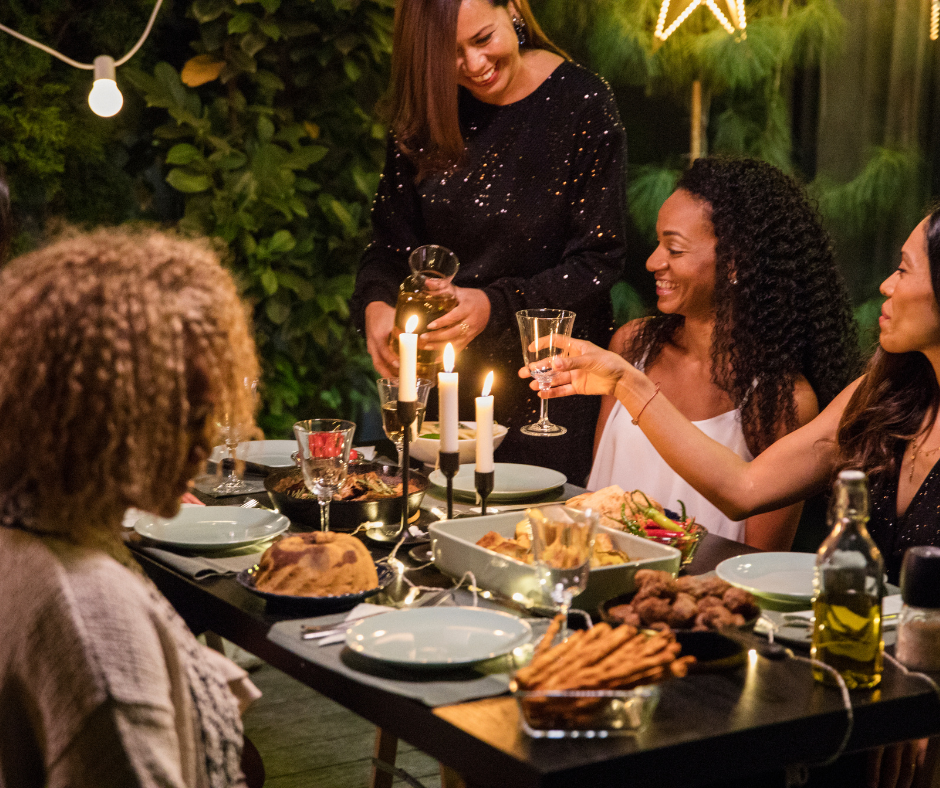While the holiday season may be something to look forward to each year, for many, it can be overshadowed by the dread of having to spend time with family members and navigate topics of conversation at the dinner table. While you may not be able to ensure a harmonious and enjoyable holiday gathering, it’s essential to be prepared and equipped with strategies to navigate potential challenges and maintain peace.
The holidays can be a stressful time, and for a lot of people, can be a source of anxiety.
As a therapist, I often support clients with navigating challenging relationships, and that usually involves supporting them with healthy boundaries and managing their anxiety over the holiday season.
Here are some practical tips to help you make the most of Thanksgiving peacefully.
Prepare for Potential Triggers & Challenges
Family therapist Vienna Pharaon emphasizes the importance of recognizing potential triggers that may lead to tensions during Thanksgiving dinner. It’s crucial to be mindful of sensitive topics or past conflicts that could resurface during the gathering. By anticipating potential roadblocks, you can mentally prepare yourself to respond in a way that protects your energy, allowing you to more easily respond with empathy and minimize the likelihood of confrontations[1].
Set Boundaries
Are you feeling unsure how to set boundaries with your family? If that’s the case, it’s okay, and you are not alone. Navigating healthy boundaries with family during the holidays can be tricky, but it is pivotal for your well-being.
Taking a leaf from Nedra Tawwab’s “Set Boundaries, Find Peace,” it’s all about chatting it out calmly with respectful communication. Addressing uncomfortable situations—be it intrusive questions or personal space invasion, gently sharing your limits while respecting others is the secret sauce. Reminding gently for small slip-ups and standing firm on non-negotiables keeps your well-being front and center, can help prevent misunderstandings, and helps ensure your safety isn’t compromised. Knowing your comfort zones and setting healthy boundaries respectfully and assertively based on that self-awareness is key.
So, during family hangouts or more formal gatherings, proactive communication by chatting upfront, setting expectations, and gently reinforcing those boundaries can help with prioritizing your mental and emotional health without severing ties unnecessarily. Remember, it’s okay to remove yourself from spaces or conversations that make you too uncomfortable. You may find stepping away to another room can help ease your anxiety from difficult conversations.
Have a Canned Response
Having a prepared response to potential confrontational situations can be immensely helpful in diffusing tension and protecting your boundaries. A rehearsed, calm, and diplomatic response can prevent escalating conflicts and steer conversations in a more positive direction. This approach allows you to maintain composure and respond thoughtfully rather than reacting impulsively[1]. So, if you know Uncle XY or Cousin Z are going to bring up an issue, be rude, or present with judgment, it can help to consider how you might respond to them ahead of time.

Do Something Relaxing Beforehand
Engaging in a relaxing activity before dinner, such as meditation, checking in with someone who’s a reliable support, yoga, or going for a walk, can help alleviate pre-existing stress and anxiety. Remember, especially during the winter months, that it’s important to have time outside, get plenty of sunlight, prioritize sleep, and move your body. By taking time for self-care and relaxation, you can enter the gathering with a calmer and more composed mindset, which can contribute to smoother interactions with family members[1].
It’s important to consult a medical professional if you’re experiencing physical symptoms. They can help to rule out other medical issues.
Ask for Help
It’s okay to enlist the help of a friend or family member. If you have a trusted person with you this holiday season, you could speak to them about how you’re feeling and ask for support in navigating these situations. Having an ally within the family can provide invaluable support during Thanksgiving dinner and the holiday season in general. Enlisting their help and support can create a united front in managing potential conflicts and diffusing tense situations. Together, you can navigate challenging conversations and support each other in maintaining a peaceful atmosphere[1].
Practice Self-Soothing Techniques
In moments of heightened tension or stress, practicing self-soothing techniques can be instrumental in maintaining composure and preventing conflicts. Whether it’s taking a brief walk outside, practicing deep breathing exercises, or finding a quiet moment for reflection, these techniques can help you stay grounded and centered during potential confrontations[1].
Remember that it might help to step away to reset and that you can always change or cancel your plans. And you don’t need to provide a reason for doing so. While some feathers might be ruffled. Hopefully, your loved ones will appreciate and support you in taking these steps to reduce your anxiety and set healthy boundaries. But some might not.
By implementing these strategies and techniques, you can navigate Thanksgiving dinner with family more peacefully and harmoniously, fostering understanding, empathy, and positive interactions.

Final Thoughts
Thanksgiving dinner can be a joyous and heartwarming occasion, whether you choose to spend it with family or others you have a connection and bond with instead. While we cannot control the approach others may take over the holidays; we hope that these tips on thoughtful preparation and strategies to help navigate potential conflicts have been helpful.
By being mindful of potential triggers, having prepared responses, and practicing self-soothing techniques, you can contribute to a more harmonious and enjoyable gathering for everyone involved. Ultimately, fostering understanding, empathy, and peaceful interactions can make Thanksgiving dinner a truly meaningful and enriching experience for the entire family.
References:
[1] “6 tips for navigating a tense Thanksgiving dinner, according to family therapist” – The Week
1) https://www.cnbc.com/2022/11/22/6-ways-to-handle-a-tense-thanksgiving-according-to-a-family-therapist.html
2) https://mediumlarge.wordpress.com/2012/11/18/how-to-make-it-through-your-familys-thanksgiving-dinner-without-making-enemies-an-ultimatum-or-a-complete-ass-of-yourself/
3) https://www.realsimple.com/holidays-entertaining/holidays/thanksgiving/thanksgiving-tips
What To Do If You Need Help
At Destination Therapy in Houston, we recommend seeking help before you reach a breaking point.
Navigating Thanksgiving dinner with your family should be a rewarding and enjoyable experience. If you need help setting boundaries and preparing for potential triggers, reach out today for a free 15-minute phone consultation.
And if you enjoyed this blog, be sure to comment and share it on social media like Facebook, Instagram, and LinkedIn.


